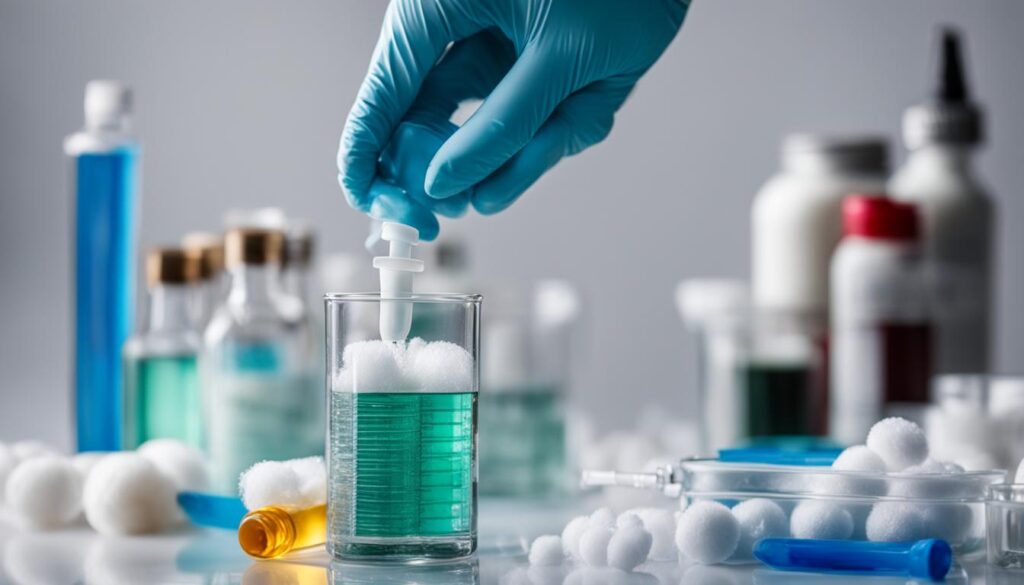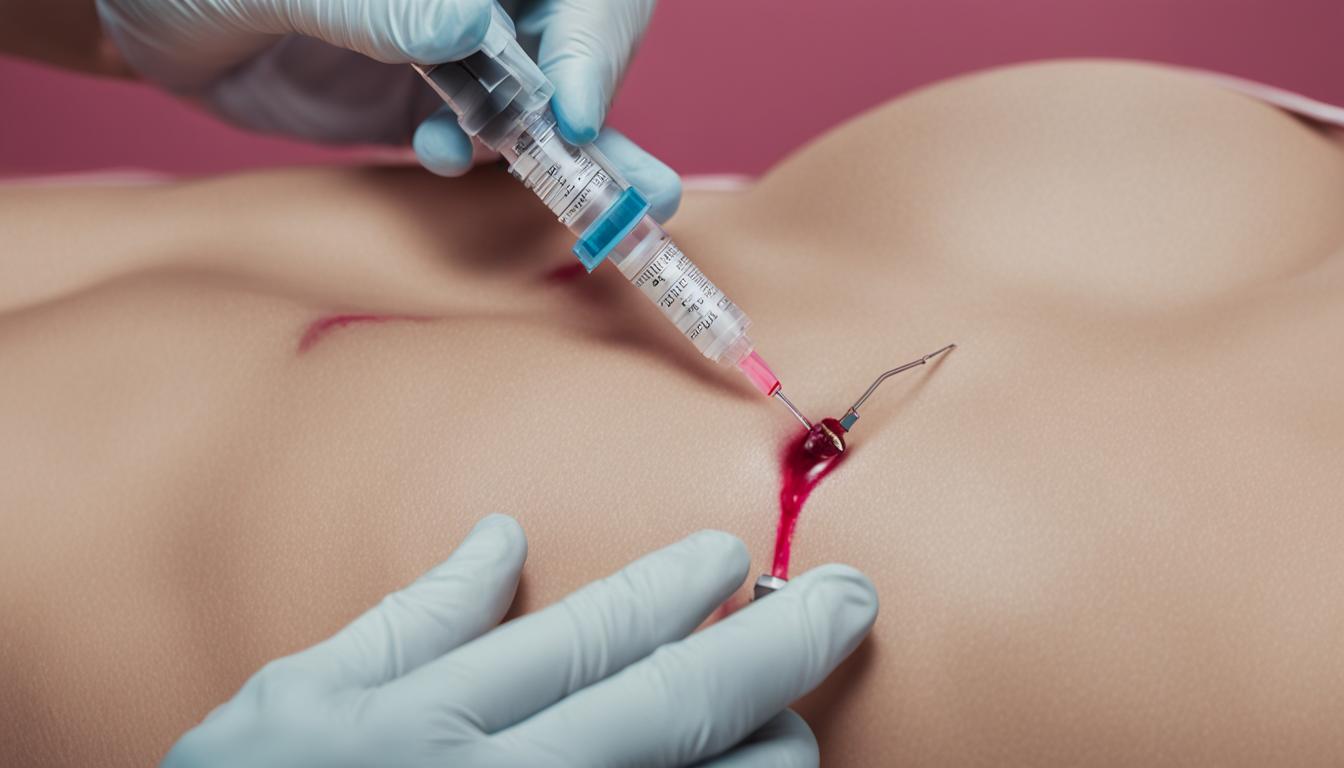The information provided in this article is intended for educational purposes only and should not be construed as medical advice. Although the author is a medical professional, the information presented here does not establish a doctor-patient relationship. Always consult with a qualified healthcare provider before making any decisions about your health or treatmentHormone injections have become a popular method for breast enlargement, offering an alternative to surgical procedures. This comprehensive guide will provide valuable information on the science behind hormone injections for breast enlargement, their effectiveness, risks, and other factors to consider. Whether you’re interested in hormone therapy for transgender individuals or natural breast augmentation, this guide will cover it all.
Contents
- 1 Understanding Hormone Injection for Breast Enlargement
- 2 The Science Behind Breast Enlargement Hormones
- 3 Hormone Therapy for Breast Enlargement in Transgender Individuals
- 4 Bioidentical Hormones for Natural Breast Augmentation
- 5 Surgical Options for Transgender Chest Development
- 6 Mammographic Changes After Hormonal Therapy
- 7 Implications of Anti-Androgens on Breast Enhancement
- 8 Factors Influencing the Effectiveness of Hormone Injections for Bigger Breasts
- 9 Comparing Systemic and Localized Hormone Treatments
- 10 Role of Progesterone in Hormone Treatment for Breast Enhancement
- 11 Assessing the Risk of Hormone Injections for Breast Augmentation
- 12 Nutritional and Lifestyle Factors That Complement Hormone Injections
- 13 Hormone Injections for Breast Enlargement: Patient Testimonials
- 14 Conclusion
- 15 Source Links
Key Takeaways:
- Hormone injections are an alternative to surgical procedures for breast enlargement.
- This guide explores the science behind hormone injections, their effectiveness, and associated risks.
- It covers hormone therapy options for transgender individuals and natural breast augmentation.
- Consider factors such as age, hormone levels, genetics, and overall health for optimal results.
- Consult with a qualified healthcare professional for personalized advice on hormone therapy.
Understanding Hormone Injection for Breast Enlargement
To understand how hormone injections work for breast enlargement, it’s essential to grasp the role of hormones in breast development. This section will explain how hormones like estrogen and growth hormones interact to stimulate breast tissue growth. Furthermore, an overview of hormone injection therapy will be provided, including the different types of hormones used, their administration methods, and the expected outcomes.The Role of Hormones in Breast Development
Hormones, such as estrogen and growth hormones, play a vital role in the development and growth of breast tissue. During puberty, estrogen stimulates the development of mammary glands, causing an increase in breast size and fullness. Additionally, growth hormones, such as insulin-like growth factor, work in conjunction with estrogen to promote the growth and proliferation of breast cells. By introducing hormone injections for breast enlargement, individuals can enhance and stimulate the natural processes of breast development, leading to an increase in breast size and volume. These injections provide a targeted approach to delivering hormones directly to the breast tissue, optimizing their effects on breast growth.Overview of Hormone Injection Therapy
Hormone injection therapy is a method of introducing specific hormones into the body to stimulate breast tissue growth and achieve breast enlargement. This therapy typically involves the administration of hormones, such as estrogen and growth hormones, through subcutaneous or intramuscular injections. Multiple types of hormones can be used in hormone injection therapy, depending on the desired outcomes and individual needs. Some common hormones used for breast enlargement include:- Estrogen: This hormone is responsible for breast development during puberty and plays a crucial role in stimulating breast tissue growth.
- Progesterone: Progesterone works in conjunction with estrogen to regulate the menstrual cycle and promote breast development.
- Growth hormones: These hormones, such as insulin-like growth factor, stimulate cell proliferation and contribute to breast tissue growth.
The Science Behind Breast Enlargement Hormones
Estrogen plays a crucial role in breast tissue growth, making it a key hormone in hormone therapy for breast enlargement. Understanding the science behind estrogen’s influence on breast development is essential for individuals considering hormone injections. This section will explore the relationship between estrogen and breast tissue growth, as well as the interaction between growth hormones and estrogen.Estrogen and Breast Tissue Growth
Estrogen is a hormone that is primarily responsible for breast development during puberty in women. It stimulates the growth and proliferation of breast tissue, leading to an increase in breast size. By binding to estrogen receptors in the cells of the breast tissue, estrogen triggers a series of biological processes that promote cell division and the accumulation of fat deposits. During puberty, estrogen levels naturally rise, stimulating the growth of the mammary glands and promoting the development of secondary sexual characteristics, including breast growth. In hormone therapy for breast enlargement, estrogen is administered to mimic the effects of natural estrogen production, stimulating breast tissue growth and enhancing breast size.Interaction Between Growth Hormones and Estrogen
In addition to estrogen, growth hormones also play a role in breast tissue growth. Insulin-like growth factors (IGFs) are hormones that work in conjunction with estrogen to promote cellular growth and division. These hormones are produced in the liver and other tissues in response to growth hormone release from the pituitary gland. IGFs enhance the effects of estrogen on breast tissue by increasing cellular proliferation, stimulating collagen production, and promoting fat accumulation. The interaction between growth hormones and estrogen is essential for achieving optimal breast enlargement results. However, it’s important to note that while hormone therapy can lead to breast growth, it does not typically result in breast development similar to that experienced during puberty. The effectiveness of hormone therapy for breast enlargement can vary depending on individual factors, such as genetics, hormone levels, and overall health. There is also a potential increased risk of certain health conditions associated with hormone therapy, including an increased risk of cancer in women receiving estrogen therapy. It is crucial to discuss the potential risks and benefits with a healthcare professional before undergoing hormone therapy for breast enlargement.| Keyword | Definition |
|---|---|
| Estrogen | A hormone that promotes breast tissue growth and is crucial for breast development. |
| Breast Growth | The enlargement of breast tissue either naturally during puberty or through hormone therapy. |
| Hormone Therapy | The use of hormones, such as estrogen, for medical treatment, including breast enlargement. |
| Increased Risk | A heightened probability of developing certain conditions or experiencing adverse effects due to hormone therapy. |
| Risk of Cancer | The potential for developing cancer, including breast cancer, as a result of hormone therapy. |
| Cancer in Women | The occurrence of cancer, including breast cancer, in the female population. |
| Growth Hormone and Insulin-Like Growth | Hormones produced in the body that work together to stimulate cell growth and proliferation, including in the breast tissue. |
| Puberty | The period of sexual maturation during which breast development and other secondary sexual characteristics develop. |
| Testosterone | The primary male sex hormone that can also be found in smaller amounts in women and can influence breast tissue growth. |
| Insulin-Like Growth Factors | Hormones that enhance the effects of estrogen on breast tissue, promoting cell division and fat accumulation. |
Hormone Therapy for Breast Enlargement in Transgender Individuals
Hormone therapy plays a significant role in the male-to-female transition for transgender individuals. Through hormone replacement therapy (HRT), transgender individuals can experience breast growth and other feminizing effects that align with their gender identity. Hormone therapy not only helps individuals achieve physical changes but also contributes to their overall well-being and self-confidence.HRT and Male-to-Female Transition
For transgender women, hormone therapy is a crucial step in their journey towards gender confirmation. HRT involves the administration of estrogen and anti-androgens to suppress testosterone levels and promote feminine characteristics. By introducing estrogen into the body, hormone therapy initiates breast development, resulting in enhanced breast size and shape. This integral aspect of the male-to-female transition aids in aligning physical appearance with gender identity.Breast Growth and Hormonal Influence
The use of hormone therapy for breast enlargement in transgender individuals relies on the influence of estrogen on breast tissue. Estrogen stimulates the growth of mammary glands, ducts, and fatty tissues, leading to increased breast size and fullness. While the extent of breast growth varies from person to person, hormone therapy significantly enhances chest development for many individuals. It’s important to note that hormone therapy may not provide the same level of breast development as gender confirmation surgery. However, for individuals who choose to undergo surgical intervention, hormone therapy can still be a foundational component in achieving optimal results. By stimulating initial breast growth and shaping breast tissue, hormone therapy sets the stage for successful transgender chest development.| Benefits of Hormone Therapy for Breast Enlargement in Transgender Individuals |
|---|
| 1. Promotes breast growth and feminizing effects |
| 2. Aligns physical appearance with gender identity |
| 3. Contributes to overall well-being and self-confidence |
| 4. Helps lay the foundation for successful gender confirmation surgery |
Bioidentical Hormones for Natural Breast Augmentation
When it comes to breast augmentation, many individuals seek natural options that provide them with the desired results without invasive procedures. Bioidentical hormones offer a promising solution for those looking to enhance their breasts naturally. These hormones, derived from plant sources, mimic the hormones naturally produced in the body, making them an attractive alternative to synthetic hormones. Bioidentical hormones are typically administered through injections, allowing for targeted delivery and effective absorption. These injections work by stimulating breast tissue growth, resulting in natural breast enlargement over time. By incorporating bioidentical hormones into a comprehensive hormone therapy plan, individuals can achieve the desired breast enhancement while minimizing the risks associated with surgical procedures. One of the primary benefits of bioidentical hormones is their ability to promote natural breast augmentation. Unlike synthetic hormones, bioidentical hormones closely resemble the hormones produced by the body, allowing for a more harmonious and balanced hormone profile. This natural approach not only helps individuals achieve their desired breast size but also minimizes the potential for side effects often associated with synthetic hormones. It is important to note that while bioidentical hormones offer a natural alternative for breast augmentation, there are certain risks and considerations to be aware of. As with any medical treatment, it is essential to consult with a qualified healthcare professional who specializes in hormone therapy to ensure that bioidentical hormones are the right option for you. They can provide personalized guidance, monitor your progress, and address any potential concerns or side effects that may arise.| Benefits of Bioidentical Hormones for Natural Breast Augmentation | Risks and Considerations |
|---|---|
|
|
Surgical Options for Transgender Chest Development
For transgender individuals seeking more significant breast development, surgical options can help achieve their desired results. There are several surgical procedures available that can enhance the chest area, including breast implant surgery and fat transfer. Breast implant surgery involves the insertion of silicone or saline implants to increase breast size and create a more feminine appearance. This procedure is commonly performed and can provide natural-looking results. The implants can be customized to suit individual preferences in terms of size, shape, and projection. Fat transfer is another surgical option for transgender chest development. This procedure involves removing fat from one part of the body, such as the abdomen or thighs, and transferring it to the breasts to enhance their size and shape. Fat transfer can provide a more natural feel and appearance, as the transferred fat integrates with the existing breast tissue. When considering surgical options for transgender chest development, it is crucial to choose a qualified and experienced cosmetic surgeon who specializes in transgender procedures. These surgeons have the expertise and understanding of the unique needs and goals of transgender individuals and can provide personalized care and guidance throughout the entire process.| Procedure | Benefits | Risks |
|---|---|---|
| Breast Implant Surgery | – Increased breast size and fullness – Natural-looking results – Customizable options | – Infection – Capsular contracture – Implant rupture |
| Fat Transfer | – Natural feel and appearance – Utilizes the body’s own tissue – Customizable results | – Fat absorption – Asymmetry – Need for multiple procedures |
Mammographic Changes After Hormonal Therapy
Hormonal therapy is a common treatment method for various medical conditions, including breast cancer, menopause, and transgender hormone therapy. However, it’s important to understand that hormonal therapy can lead to noticeable changes in mammographic images.Impact of Hormones on Breast Parenchymal Density
Hormones play a significant role in breast parenchymal density, which refers to the glandular and fibrous tissues in the breast. When undergoing hormonal therapy, these tissues can undergo changes that are detectable through mammography. Estrogen, one of the primary hormones involved in hormonal therapy, can increase breast parenchymal density. This can lead to a denser appearance on mammography images, making it more challenging to detect small abnormalities such as breast cancer. On the other hand, some studies suggest that certain types of hormonal replacement therapy (HRT), which involves the use of hormones to replace those no longer produced by the body, may decrease breast parenchymal density. This can improve the accuracy of mammography in detecting breast cancer.Hormonal Replacement Therapy and Mammography Accuracy
The impact of hormonal replacement therapy on mammography accuracy is a topic of ongoing research and discussion. While some studies indicate that HRT can improve mammography accuracy by reducing breast parenchymal density, others highlight potential limitations and challenges. It’s important for individuals undergoing hormonal therapy to discuss their treatment and any potential changes in breast parenchymal density with their healthcare providers. This enables healthcare providers to make informed decisions about mammography screening, considering factors such as the individual’s medical history, risk factors, and treatment goals. Monitoring and follow-up mammograms are essential to ensure the effectiveness of mammography screening for individuals undergoing hormonal therapy. Regular communication with healthcare providers is crucial, as they can provide guidance on the optimal timing and frequency of mammograms to ensure accurate and reliable results.| Key Takeaways |
|---|
| Hormonal therapy can lead to changes in breast parenchymal density, affecting mammographic images. |
| Estrogen, a primary hormone involved in hormonal therapy, can increase breast parenchymal density. |
| Hormonal replacement therapy (HRT) may decrease breast parenchymal density, potentially improving mammography accuracy. |
| Regular monitoring and communication with healthcare providers are essential for individuals undergoing hormonal therapy. |
Implications of Anti-Androgens on Breast Enhancement
When it comes to hormone therapy for breast enhancement, anti-androgens are often used in conjunction with estrogen. These medications play a crucial role in regulating the levels of testosterone in the body, which can have significant implications for breast tissue growth and overall breast enhancement. Testosterone is a hormone primarily associated with male characteristics, including muscle development and body hair growth. However, it can also inhibit the growth of breast tissue in individuals seeking breast enhancement. By using anti-androgens to suppress testosterone levels, hormone therapy aims to create an environment conducive to breast tissue growth. Anti-androgens work by blocking the receptors that testosterone binds to in the body, effectively limiting the hormone’s effects. By reducing testosterone’s influence, they contribute to creating hormonal balance and allow estrogen to exert its feminizing effects more effectively.Factors Influencing the Effectiveness of Hormone Injections for Bigger Breasts
Various factors can play a role in determining the effectiveness of hormone injections for breast enlargement. These factors include:- Age: The age of the individual undergoing hormone treatment can impact how their body responds to the injections. Younger individuals may experience more significant breast growth compared to older individuals.
- Hormone Levels: The starting hormone levels of the individual can influence the outcomes of hormone therapy. Individuals with lower hormone levels may see more noticeable results.
- Genetics: Genetic factors can affect how the body responds to hormone injections. Some individuals may have a genetic predisposition for greater breast tissue growth, while others may have limitations in their response.
- Overall Health: The overall health and well-being of an individual can impact the effectiveness of hormone injections. A healthy lifestyle, including proper nutrition and exercise, can contribute to optimal results.

Comparing Systemic and Localized Hormone Treatments
Hormone treatments for breast enlargement can be administered through two main approaches: systemic and localized. Each method has its own effects on breast tissue and varies in how hormones are absorbed based on different administration routes.Systemic vs. Local Effects on Breast Tissue
Systemic hormone treatments involve the administration of hormones that circulate throughout the body, affecting various tissues and organs, including the breasts. These treatments typically involve oral medication or injections that deliver hormones directly into the bloodstream. As a result, systemic hormone treatments can promote overall breast tissue growth, but their effects may not be exclusive to the breasts. In contrast, localized hormone treatments target the breast tissue directly, allowing for a more targeted approach. This method typically involves the application of creams, gels, or patches directly to the breasts. Localized treatments focus on delivering hormones specifically to the breast area, which may allow for a more concentrated effect on breast tissue growth.Influence of Administration Routes on Hormone Absorption
The choice of administration route for hormone treatments can significantly affect hormone absorption rates and efficacy. For systemic treatments, oral medication and injections offer direct access to the bloodstream, ensuring efficient hormone absorption throughout the body. On the other hand, localized treatments, such as creams and patches, deliver hormones directly to the breasts, allowing for absorption in the targeted area. It’s important to note that the absorption of hormones can vary depending on the administration route chosen. Factors such as skin permeability and metabolism can influence the extent to which hormones are absorbed by the body. Overall, the choice between systemic and localized hormone treatments depends on individual preferences, goals, and medical considerations. While systemic treatments may offer broader effects on overall body composition, localized treatments provide a more targeted approach for breast enhancement. Consulting with a healthcare professional is crucial to determine the most suitable treatment option based on individual needs and preferences.Role of Progesterone in Hormone Treatment for Breast Enhancement
Progesterone is an important hormone in the journey towards breast enhancement. While estrogen is often associated with breast development, progesterone plays a significant role as well. Understanding the effects of progesterone on breast development is crucial for those considering hormone treatment for breast enhancement. Progesterone’s impact on breast development involves several mechanisms. It stimulates the growth and differentiation of the milk-producing glands in the breasts, known as lobules. This hormone also promotes the development of ducts, which facilitate milk transportation. Combined use of progesterone with estrogen can yield enhanced breast enlargement results. Estrogen is known for its ability to stimulate breast tissue growth, but it can also cause fluid retention and bloating. Progesterone helps counteract these effects by promoting a balanced response and minimizing unwanted side effects. When progesterone is used in conjunction with estrogen, it can increase the effectiveness of hormone treatment for breast enhancement. The combined use of both hormones synergistically influences breast tissue growth and development, resulting in a more comprehensive and satisfactory outcome.Progesterone Effects on Breast Development
| Progesterone Effects | Explanation |
|---|---|
| Stimulation of Lobule Growth | Progesterone promotes the growth and differentiation of milk-producing glands in the breasts. |
| Promotes Duct Development | Progesterone plays a role in the development of ducts, which transport milk. |
| Counteracts Estrogen Side Effects | Progesterone helps counteract fluid retention and bloating associated with estrogen. |
Assessing the Risk of Hormone Injections for Breast Augmentation
When considering hormone injections for breast augmentation, it is important to assess the potential risks involved. Like any medical treatment, there are factors to consider regarding long-term health and managing potential side effects.Long-term Health Considerations
Prior to undergoing hormone injections, individuals should be aware of the long-term health considerations. While hormone therapy can provide desired breast enlargement results, it is crucial to understand the potential impacts on overall health. Ongoing monitoring and consultation with a healthcare professional are essential to evaluate any potential long-term effects.Monitoring and Managing Potential Side Effects
Just as with any medical treatment, hormone injections for breast augmentation come with potential side effects. It is important for individuals to be aware of these and take steps to monitor and manage them effectively. Regular check-ups with a healthcare professional can help identify and address any side effects that may arise during the course of hormone therapy. In summary, individuals considering hormone injections for breast augmentation should prioritize risk assessment, long-term health considerations, and strategies for monitoring and managing potential side effects. By staying informed and working closely with a healthcare professional, individuals can make informed decisions regarding hormone therapy for breast enlargement.Nutritional and Lifestyle Factors That Complement Hormone Injections
Nutritional and lifestyle factors play a crucial role in optimizing the effectiveness of hormone injections for breast enlargement. Paying attention to your diet and incorporating physical activity can enhance hormone balance and overall hormonal efficacy. In this section, we will explore the importance of a balanced diet in hormone balance and the role of physical activity in maximizing the benefits of hormone therapy.Importance of Diet in Hormone Balance
A well-rounded and nutritious diet provides the essential nutrients needed for hormone regulation and balance. Consuming a variety of foods can support the body’s hormonal functions and promote healthy breast tissue growth. Some key nutritional factors to consider include:- Incorporating foods rich in phytoestrogens, such as soy, flaxseeds, and chickpeas, which can mimic the effects of estrogen in the body.
- Ensuring an adequate intake of protein, which is essential for tissue repair and growth.
- Including healthy fats, such as avocados and nuts, which aid in hormone production and regulation.
- Consuming a variety of fruits and vegetables to provide essential vitamins and minerals that support hormonal balance.
- Avoiding processed foods and excessive sugar, as they can disrupt hormone levels and negatively impact overall health.
Role of Physical Activity in Enhancing Hormonal Efficacy
Regular physical activity is not only beneficial for overall health but also plays a significant role in enhancing hormone efficacy. Engaging in exercise can help optimize the effects of hormone injections for breast enlargement. Here are some ways physical activity can support hormonal balance:- Promoting blood circulation, which aids in the distribution of hormones throughout the body.
- Stimulating endorphin release, which can positively impact overall well-being and mental health.
- Supporting weight management and body composition, as excess body fat can disrupt hormone balance.
- Boosting metabolism, which can help optimize the utilization and effectiveness of hormones.

Hormone Injections for Breast Enlargement: Patient Testimonials
Patient testimonials offer genuine insights into the experience of undergoing hormone injections for breast enlargement and serve as a source of inspiration for individuals considering this form of treatment. These real-life success stories provide first-hand accounts of the journey towards achieving larger and more shapely breasts through hormone therapy. Patients who have undergone hormone injections for breast enhancement have shared their positive experiences and the transformative effects on their self-confidence and body image. These testimonials highlight the effectiveness of hormone therapy in achieving desired breast enlargement results and offer valuable reassurance to potential candidates seeking alternatives to surgical procedures. “I am thrilled with the results of hormone injections for breast enlargement. Not only have my breasts become fuller and more proportionate, but my overall self-esteem and body confidence have skyrocketed. It’s a life-changing experience!” – Sarah “As a transgender woman, hormone injections have been pivotal in achieving the feminine figure I’ve always desired. The breast enhancement I’ve experienced through hormone therapy has helped me align my physical appearance with my gender identity.” – Emily “I was skeptical about hormone injections for breast enlargement, but after seeing the amazing results in others, I decided to give it a try. I am delighted with the outcome. My breasts have become more voluptuous, and I feel much more confident in my own skin now.” – Jessica “After extensive research and consultation with medical professionals, I opted for hormone injections for breast enlargement instead of surgery. The results exceeded my expectations, and I couldn’t be happier with my decision. It’s a non-invasive approach that has truly changed my life.” – Lisa These patient testimonials provide genuine accounts of the positive impact hormone injections can have on breast enhancement. While individual experiences may vary, they offer valuable insights into the potential benefits of hormone therapy for achieving larger and more attractive breasts.Conclusion
In conclusion, hormone treatments offer a non-surgical option for breast enhancement. Throughout this guide, we have explored the science behind hormone injections for breast enlargement, the role of hormones in breast development, and the potential risks and benefits associated with hormone therapy. For those considering hormone treatments, it is crucial to weigh the benefits against the risks and consider various factors that can influence the effectiveness of the treatment, such as age, hormone levels, genetics, and overall health. It is highly recommended that potential candidates consult with a qualified healthcare professional to determine the best approach for their individual needs and goals. By providing a summary of the key points discussed in this guide, we aim to equip individuals with the necessary information to make informed decisions about hormone injections for breast enlargement. While hormone treatments can offer noticeable results, it is important to prioritize safety and consult with medical professionals throughout the process.Source Links
- https://mwbreast.com/transgender-breast-growth-in-male-to-female-patients/
- https://encyclopedia.pub/entry/30800
- https://www.ncbi.nlm.nih.gov/pmc/articles/PMC1121850/
This is where the doctor will answer all your questions
Dr. Ethan Walker stands out as a highly adept and seasoned plastic surgeon, focusing on breast augmentation and lift procedures. With a robust 15-year background in breast surgery, he has positioned himself as a foremost authority in the field. Dr. Walker's commitment to precision and his artistic approach have cemented his reputation as one of the premier plastic surgeons for achieving natural and aesthetically pleasing results in breast augmentation and lifts.
Educational Background and Credentials:
-Medical Degree: Duke University School of Medicine
-Plastic Surgery Residency: University of Pittsburgh Medical Center
-Aesthetic Surgery Fellowship: Cleveland Clinic
-Board Certification: American Board of Plastic Surgery
-Memberships: American Society of Plastic Surgeons (ASPS), American College of Surgeons (ACS)
Educational Background and Credentials:
-Medical Degree: Duke University School of Medicine
-Plastic Surgery Residency: University of Pittsburgh Medical Center
-Aesthetic Surgery Fellowship: Cleveland Clinic
-Board Certification: American Board of Plastic Surgery
-Memberships: American Society of Plastic Surgeons (ASPS), American College of Surgeons (ACS)
Questions to the expert
How do hormone injections work for breast enlargement?
What hormones are used in hormone injection therapy for breast enlargement?
What are the expected outcomes of hormone injection therapy for breast enlargement?
Is hormone therapy for breast enlargement a suitable option for transgender individuals?
Are hormone injections a natural alternative for breast augmentation?
What surgical options are available for transgender chest development?
Can hormone therapy affect mammography accuracy?
How do anti-androgens impact breast enhancement?
What factors can influence the effectiveness of hormone injections for breast enlargement?
What are the different administration routes for hormone treatments, and how do they impact breast enlargement?
What role does progesterone play in hormone treatment for breast enhancement?
What are the potential risks of hormone injections for breast augmentation?
How can nutritional and lifestyle factors complement hormone injections for breast enlargement?
Are there any testimonials from individuals who have undergone hormone injections for breast enlargement?
Can you summarize hormone treatments for breast enhancement?
What are the final considerations for potential candidates considering hormone injections for breast enlargement?
The information provided on this page about breast augmentation surgical procedures is intended for informational purposes only. It is not intended to be a substitute for professional medical advice, diagnosis, or treatment. Always consult with a qualified healthcare professional for personalized advice and guidance on breast augmentation.Risks and Complications:
Breast augmentation surgery is a major surgical procedure with potential risks and complications. These risks include infection, bleeding, scarring, implant rupture, and changes in breast sensation. It is important to discuss these risks with your doctor before making a decision about breast augmentation surgery.Consult a Qualified Medical Professional:
If you are considering breast augmentation surgery, it is important to consult with a qualified medical professional. A qualified plastic surgeon can provide you with personalized advice and guidance on the risks, benefits, and alternatives to breast augmentation surgery. They can also help you choose the right type of breast implant and surgical technique for your individual needs and goals.








